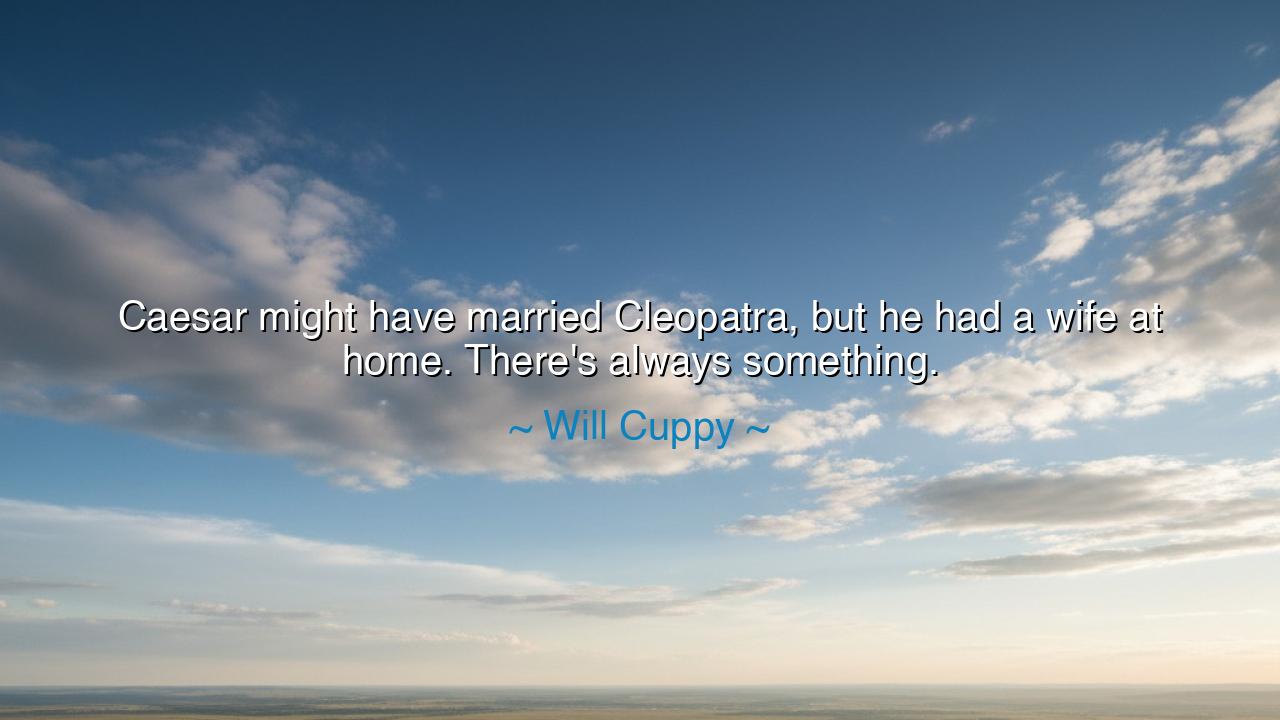
Caesar might have married Cleopatra, but he had a wife at home.
Caesar might have married Cleopatra, but he had a wife at home. There's always something.






Hearken, children of the ages, to the words of Will Cuppy, the observer of history and human foible: "Caesar might have married Cleopatra, but he had a wife at home. There's always something." Here lies a teaching both wry and profound, a reflection on human desire, circumstance, and the complexities of obligation. Even the mighty are bound by ties, duties, and the inescapable currents of life, which temper ambition and passion alike.
Know that in these words there is both humor and insight. To marry in the grand manner of history is to navigate not only the heart, but the webs of duty and expectation. Caesar, though drawn to the allure of Cleopatra, remained tethered by his existing wife—a reminder that life rarely grants freedom from consequence, and that human plans are always shadowed by other claims and obligations. The ancients would counsel that foresight, prudence, and awareness of circumstance are as vital as desire or courage.
Yet, consider also the subtle truth of inevitability: “there’s always something.” Every choice, every union, every pursuit is entangled with conditions, rivals, and unforeseen barriers. Cuppy’s wry observation teaches that even greatness is subject to the hidden forces of life, and that one’s plans, no matter how grand, must reckon with the realities that endure beyond personal will.
And behold, there is heroism in humility. To acknowledge that circumstance shapes even the actions of the mighty is to temper ambition with wisdom. Cuppy reminds us that desire alone does not dictate destiny; the fabric of life is woven from responsibility, circumstance, and the often-hidden threads that guide the fate of all, from Caesar to the humblest soul.
Thus, remember, future generations: ambition and desire must be tempered with prudence, for every pursuit carries its unseen entanglements. Even the mighty who marry for love or power are constrained by ties already forged, by the wife or obligations that life imposes. Awareness of this balance is the mark of wisdom and foresight.
In the end, the ancients would say: laugh at human folly, but learn from it. For even in the grandeur of history, there is always some constraint, some hidden something that guides action, tempers desire, and shapes the unfolding of destiny. To navigate life wisely is to see both ambition and limitation, and to act with courage, insight, and humility.






ALTran Thi Anh Ly
Will Cuppy’s words shed light on the ironic and sometimes tragic nature of human behavior. Even someone like Caesar, who had it all, faced personal complications. It makes me think—how do we deal with our own 'something' in relationships, whether it’s an existing commitment, personal conflicts, or external pressures? How can we learn to manage these complexities while staying true to our desires and responsibilities?
NHTran Ngoc Hanh
I find this quote intriguing because it reflects a timeless truth about relationships and human nature. No matter how much we might want something, there’s often an obstacle or complication in the way. In this case, Caesar's commitment to his wife. How do we navigate these complexities in our own lives? Do we ever truly get to have it all, or is there always a sacrifice to be made?
NVLam Khanh Nguyen Viet
Will Cuppy’s take on Caesar and Cleopatra’s relationship makes me think about the complexities of human connections, even among the greatest historical figures. There’s always something, whether it's conflicting responsibilities, desires, or obligations. But it makes me wonder: how do we balance our personal desires with our responsibilities? Is there ever truly a perfect solution, or do we always face some kind of compromise or conflict?
ALMai Anh Le
This quote is both humorous and insightful. It reminds us that even the most powerful figures in history, like Caesar, are not immune to the complexities of relationships and human nature. It’s interesting how Cuppy highlights that there’s always something—a reminder that no situation is ever as simple as it seems. Does this mean that no matter how much power someone holds, they can never fully escape personal conflict or desire?